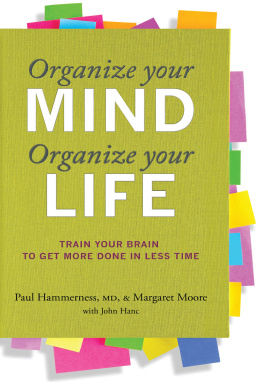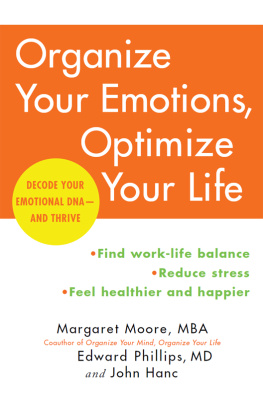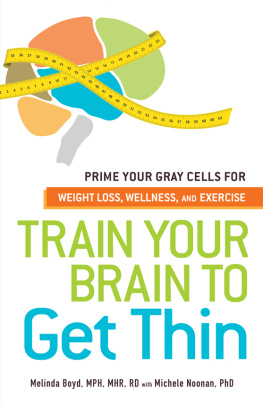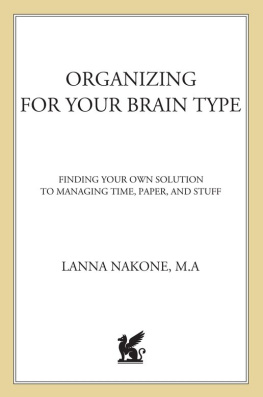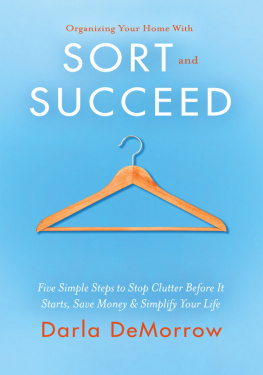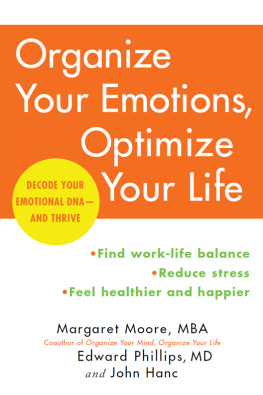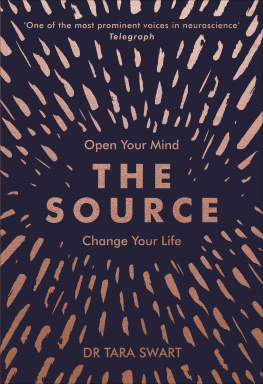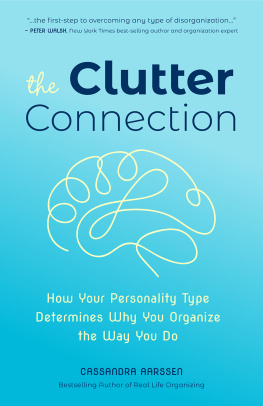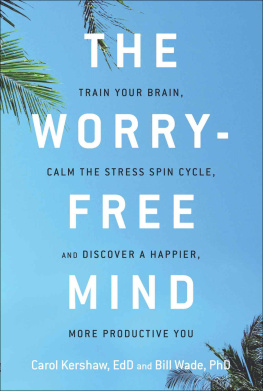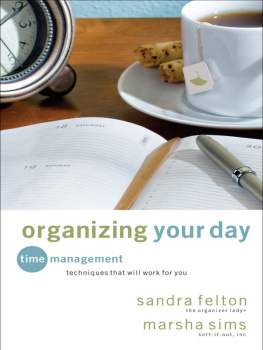HOW ORGANIZED ARE YOU?
(Please answer A, B or C.)
- A. VERY ORGANIZED. My desk is neat, I never miss an appointment or a deadline, my friends are amazed, my co-workers are jealous and my boss loves me.
- B. MODERATELY ORGANIZED. I manage to stay on top of things pretty well, but sometimes I feel overwhelmed, not sure what to do first, and I must admit that Im a little jealous of my colleagues and my boss who seem more organized.
- C. COMPLETELY DISORGANIZED. In fact, Ill be lucky if I can remember where I parked my car. Thats assuming I dont get a text or a phone call in the next two minutes, which will completely throw me off andwhat was the question again?
If you answered A, B or C, this book is for you! In Organize Your Mind, Organize Your Life, we share with you the six key ways in which you can use top-down organization to get more done in a lot less timeand feel good about it.
By top-down organization, we mean brain science. As you will see, there are amazing new insights gleaned about the way our brain works to organize our thoughts, actions and emotions. Through hightech brain scans, or neuroimaging, we can now see the response of the brain to various situations. Heres an exciting example of what scientists have found.
THE ORGANIZED BRAIN IN ACTION
In a 2008 study, subjects were shown a series of pleasant, unpleasant and neutral pictures while they were attempting the difficult task of keeping in check their emotional reactions. Through the use of hightech brain imaging or neuroimaging, researchers were able to observe the thinking regions of the subjects brains (including areas called the prefrontal cortex and the anterior cingulate cortex) managing the emotion-generating parts of the brain. Its an intriguing new study that sheds light into the brains own built-in system of organization and regulationone that strives for order, one that can tamp down (suppress) our emotions when necessary.
As we will show you, once you can better manage your emotions, you can then begin to harmonize and focus the various thinking parts of your brain, opening up a whole new world before you. Youre on your way to achieving a more organized, less stressful, more productive and, in many ways, more rewarding life. Andheres the most exciting partthe features in the brains magnificent self-regulation system come preloaded in every functioning human mind; these features can be accessed, initialized and utilized to allow you to become better organized and to feel more on top of things.
You just have to know how to do it. Thats what this book will show you.
WHAT MAKES THIS ORGANIZATION BOOK DIFFERENT?
This is not a book meant to give you tips on how to rearrange your desk, to make lists or to set up a better system for keeping track of your appointments.
This is a prescriptive book that will help you better organize your life by better organizing your mind, by making some basic changes in the way you think about and deal with your work, your colleagues, your family and yourself on a day-to-day basis. As a result, you will become better focused, more attentive, less distracted and better able to adapt to new situations and changes that, in the past, might have overwhelmed you.
Organize Your Mind, Organize Your Life is organized differently than most self-help books. At its core is a unique partnership between a leading Harvard clinician-researcher and a leader in coaching for health and well-beinga collaboration that serves as a model for the future and can help make a big impact on readers like yourself. In a physician-coach partnership, a new concept in personal health, a Doctor of Medicine diagnoses the problem, explains what you need to do and plants the seeds for you to make the change. Then, a certified wellness coach guides you through implementation of the change.
Here is our team:
PAUL HAMMERNESS, MD , is an Assistant Professor of Psychiatry, Harvard Medical School; Assistant Psychiatrist, Department of Psychiatry, Massachusetts General Hospital; and Child and Adolescent Psychiatrist, Newton Wellesley Hospital. Dr. Hammerness has been involved in research on the brain and behavior for the past 10 years, with a focus on Attention Deficit Hyperactivity Disorder (ADHD). He has lectured on the topic locally, nationally and internationally to other physicians, mental health professionals, educators and families. In his clinical practice, Dr. Hammerness sees on a daily basis what a clinically disorganized mind looks like across the age spectrum, whether its an eight-year-old who is struggling in school due to inattention or a forty-eight-year-old professional woman whose life-long organizational problems are now affecting her work and family life. From research, and from witnessing the struggles of people with clinically disorganized or distracted brains, Dr. Hammerness shares his insights into what a well-ordered brain can do.
MARGARET MOORE , aka Coach Meg, is codirector of the Institute of Coaching at McLean Hospital, and a founding advisor of the Institute of Lifestyle Medicine at Spaulding Hospital, both affiliates of Harvard Medical School, founder of a leading coach training school, Wellcoaches, and co-author of a coach training textbook. Margaret and the thousands of coaches she has trained have helped guide tens of thousands of clients through important and positive changes in their health, work and personal lives.
We mentioned the preponderance of books on getting organized that are available. Maybe there are a couple right next to this one. While many of them are good, they often use a bit of an outdated model that begins with organizing your surroundingsyour office, your desk, your householdrather than organizing your mind. Dr. Hammerness and Coach Meg have a new approach based on the latest scientific literature that employs a top-down (that is, starting with your brain) organizational processachieved by first understanding six key brain concepts and then employing specific coaching strategies to integrate each of these into your daily life, with astounding results.

